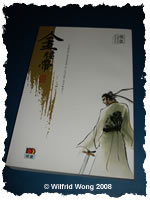
This has to be a coincidence. I randomly picked four Chinese novels to read from the library. The previous book is a collection of nine short stories. This books is also a collection of nine short stories. Relationship, especially in the form of divorce, is one of the themes of the previous book. Same for this book. The previous book writes in a certain style of surrealism blurring reality with illusion. This book, same. And when one of the stories from 《早苗》“Zoumiu” – note that I translate based on the pronunciation because the title is derived from a female name – has a scene of the main character pondering with a glass of cold beer, I flipped. It was as though I was reading 《嘉年華會》(“Carnival”). The beer, the divorce, the surrealism, the same number of stories – either it is a common trend in today’s Chinese literature bear in mind that “Zoumiu” is written by a Taiwanese writer while “Carnival” by a Hong Kong writer, the coincidence is simply, surreal.
Before I comment on the “Zoumiu”, I would like to write a bit on what I observe on the languages of these two geographic locations (can’t really say countries, can I?). Hong Kong and Taiwan are most likely the only two places in this entire world that the people still write in Traditional Chinese. I sincerely wish with all my heart that Traditional Chinese will not vanish, swallowed by the Simplified Chinese so commonly promoted by China. For those who wonder what the difference between the two is, it is as though “Simplified English” becomes official and words such as ‘wot’, ‘happend’, ‘wif’, ‘btw’, ‘u’, ‘tt’, ‘impresn’ become the endorsed language. Imagine English classics printed with those simplified forms. The analogy may be crude and not entirely correct. But the essence is there. And that is how I feel when I read Simplified Chinese.
While I was reading “Zoumiu”, I realize that the choice of words between these two places – Hong Kong and Taiwan – can be different. An analogy could be the subtle difference when you read British novels and American novels. Both are written in English. But there are differences between the two. I, for one, read Hong Kong novels at a much faster pace.
At times, I am not sure which culture is more dramatic in nature – Taiwan or Hong Kong? “Zoumiu” is prefaced by two I supposed reputable writer and editor in Taiwan. Full of over-the-top promises that set my expectation sky high on “Zoumiu”, before I have even started reading the book. The author 張子璘 has won the 1st prize of the Taiwan’s “Save the Literature” award. “Zoumiu” is a story of love, and death. Death is the center theme. The nine stories are: 《早苗》《那個中午》《夜裡》《活者的記憶》《背影》《陌生人》《等待》《嫉妒的漂浮》《緩慢的自由》. Again, for ease of reference, I would translate the titles to “Zoumiu”, “That Afternoon”, “In the Night”, “Memory of the Living”, “View of the Back”, “Stranger”, “To Wait”, “Jealousy Afloat”, “The Slowness of Freedom”.
“Memory of the Living” has perhaps the most impact on me. In the story, the main character’s mother often stares outside the window, every passing moment of the day, holding a little black box. One day, the main character returns home and discovers his mother has committed suicide. He then opens the box and understands what his mother meant by: “I will tell it to you one day, until you mother is too tired, cannot hold it any longer, and I will pass it to you”. My heart sunk when I too discovered what it is.
Another favorite story of mine is “Stranger”. One day, a girl discovers a corpse like stranger appears in her home. And through interacting with this stranger, conversing on the topic of her first divorce and second marriage, the stranger does not seem that foreign any more. An extract of the story below (the author puts an extract upfront at the beginning of each story, interestingly).
要不是岀現了陌生男子,今天也不過是如此平常的一天,回頭看看剛才走過的路,著實讓她安心不少。那個險白得像個死屍的男人,現在想起来也不覺得害怕了。
The rest of the stories, like these two, explore on the decisions people make, on love, at times observed from a distance, almost like reading from a spirit’s view, or indeed from a spirit’s view. Some stories are inconclusive leaving me to ponder on what is real and what is not. One story, “Jealousy Afloat”, the main character is obsessed with the memory and illusion of his lost love decades ago, keeps revisiting old places until he sees her, together with the younger him. The writing style of that story could seem extreme, but I tend to think that the author is gifted in bringing human interactions alive.
Additional Info: Singapore library tag is ZGZL, Wisdom Books official site, and ISBN 978-957-450-508-1.







